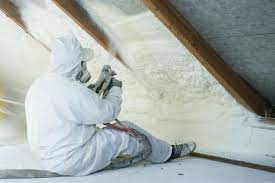Spray foam insulation is an excellent option for homes that want a more energy-efficient design and a more comfortable interior. Its high R-value means that it can reduce the workload on HVAC systems. In fact, it can reduce your HVAC sizing by as much as 35%. It can be installed in walls, roof decks, and crawl spaces.
A professional spray foam insulation company will work to find the best product for your building’s needs. There are two types of spray foam insulation, closed-cell and open-cell. To choose the best one for your project, call Dr. Energy Saver for assistance. Open-cell foam is extremely light, which makes it ideal for smaller areas. In addition, open-cell foam is low in density, which means it can fill more areas with less material. However, it has a lower R-value than closed-cell foam.
 Another advantage of spray foam insulation is its ability to seal cracks and holes. This is especially beneficial in basements and unfinished areas, where it can prevent moisture and mold growth. Closed-cell foam insulation is also effective for strengthening walls and buildings during storms. Spray foam can also dampen outside noise. If you wish to learn more about this, visit Spray foam insulation
Another advantage of spray foam insulation is its ability to seal cracks and holes. This is especially beneficial in basements and unfinished areas, where it can prevent moisture and mold growth. Closed-cell foam insulation is also effective for strengthening walls and buildings during storms. Spray foam can also dampen outside noise. If you wish to learn more about this, visit Spray foam insulation
A professional can customize the foam mix and install it in your home, so you can maximize its effectiveness. While DIY installation can be affordable, it’s best to hire an experienced professional for a successful result. Costs can range from $1,300 to $4,500 for an average-sized home. If you need to insulate an existing home, you’ll pay between $5,000 to $10,000.
Spray polyurethane foam insulation is an excellent option to keep your home comfortable, lower your energy bills, and increase the value of your home. This type of insulation provides a continuous air-sealing barrier, which is essential to preventing mold growth. It also eliminates drafts and condensation.
There are two types of spray foam insulation: open-cell foam and closed-cell foam. Closed-cell foam is denser and more flexible, while open-cell foam is less dense and is best suited for attics and basements. The closed-cell foam is more stable and will not expand when it comes into contact with water.
Commercial buildings can benefit from spray foam insulation. It can reduce energy costs by increasing energy efficiency. It can also help protect a home against severe weather events. Spray foam insulation is an environmentally-friendly solution, so it’s an excellent choice for many types of homes. It’s also an excellent choice for older homes and new construction.